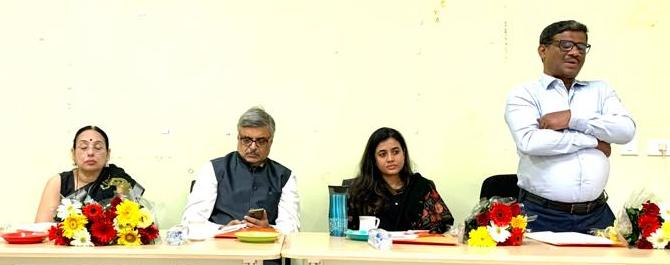Bhubaneswar: The Journalism and Mass Communication Programme under Utkal University’s Department of Public Administration organised a seminar on ‘Narratives of Nationalism in Bollywood Cinema’ at Centre for Innovation and Incubation (CII) here on Saturday.
Addressing the seminar as chief speaker, Assistant Professor of School of Communication, XIM University, Bhubaneswar Dr. Nadira Khatun explained various Bollywood movies that reflected different shades of Indian nationalism. Ranging from colonial (1912-1946), post-colonial (1947-1965), emergency period (1966-1990), neoliberal states (1991-2005) to contemporary Bollywood films (2005-2020), there are multiple narratives at any one time as the nation is a complex proposition with many issues confronting it, she said.
While D.G. Phalke’s Raja Harishchandra (1913), popularly referred to as the first Indian feature film, is a Hindu mythological film, Hiralal Sen’s Alibaba (1903) is based on Arabian Nights fantasy which points to the presence of a different cultural universe. Social genre had overshadowed the mythological and the fantasy genre during colonial era. Similarly, Hindi cinemas had reflected nationalism through melodramatic form during post-colonial era. Mother India (1956), for instance, addressed the issue of agrarian unrest – covertly pointing at Telangana – and held up the rebel’s punishment as fitting, she cited.
In her concluding remark, Dr. Khatun said Bollywood cinema has been successful in selling the idea of ‘Nationalism’ to Indians. These nuances have produced an entirely new paradigm in Indian cinema. The message here is that “Indian-ness” is much more than an innate spirit, she added.
Speaking on the occasion, Media Consultant and Visiting Professor of Utkal University Dr. Pratap Aditya Mishra said the nationalist sentiment is said to be the most dominant sentiment of man. Contemporary movements in the realm of culture and entertainment are inspired by collective nationalist motives, as can be seen in the case of Indian cinema.
Chairman of PG Council, Utkal University Prof. Durga Shankar Pattanaik asked the students to make critical observations of films in order to understand the cinematic works. Filmic analysis can be used to help conceptualise critical thinking for university students, he suggested.
While Head of Public Administration Department Prof. Padmalaya Mahapatra gave the welcome address and introduced the guests, Assistant Professor Dr. Hemanta Kumar Dash presented the key takeaways of the lecture. Associate Professor Dr. Pratima Sarangi, Assistant Professor Dr. Jyotirmayee Tudu, Assistant Professor Dr. Ramakanta Mahananda, research scholars Manoranjan Panda and Saurav Prakash Shit were present. Miss Ankita, a student of MJMC First Semester, coordinated the proceedings while Miss Sudeshna, a student of MJMC Third Semester, delivered the Theme Note of the lecture.







